Why Choosing the Right Mortuary Cot Is Critical for Your Operations
A mortuary-cot is a specialized stretcher designed for the dignified transport and handling of deceased individuals during first-call removals and transfers between facilities. Unlike standard ambulance stretchers, mortuary cots feature specific design elements like adjustable height levels, improved weight capacities, and stair-navigation guides to ensure safe, respectful handling during the most sensitive moments of funeral service.
Quick Answer - Essential Mortuary Cot Facts:
- Weight Capacity: 350-1,000+ lbs (standard to bariatric models)
- Price Range: $1,095 - $4,500 depending on features and capacity
- Key Types: Standard, bariatric, high-loading, folding, pediatric
- Top Brands: Ferno, MOBI, Junkin with 2-year warranties typical
- Must-Have Features: Multi-level height adjustment, one-person operation, stair guides
The mortuary cot market offers everything from basic 350-lb folding stretchers at $1,095 to heavy-duty bariatric models supporting over 1,000 lbs at $4,400. As one funeral home operator noted about their MOBI stretcher: "We already used it for (transporting) 450 pounds... was smooth and easy to operate."
The selection process matters more than you might think. The wrong cot can compromise operator safety, damage your reputation, or simply fail when you need it most. Features like multi-level height adjustment enable single-person operation, while specialized accessories like slider boards and cot covers improve both safety and dignity during transport.
I'm Mortuary Cooler, and as a national-level mortuary cooler supplier, I've worked with hundreds of funeral homes to optimize their first-call operations, including selecting the right mortuary-cot systems that integrate seamlessly with cooling and storage workflows. My experience has shown that the right equipment choice upfront prevents costly operational headaches down the road.
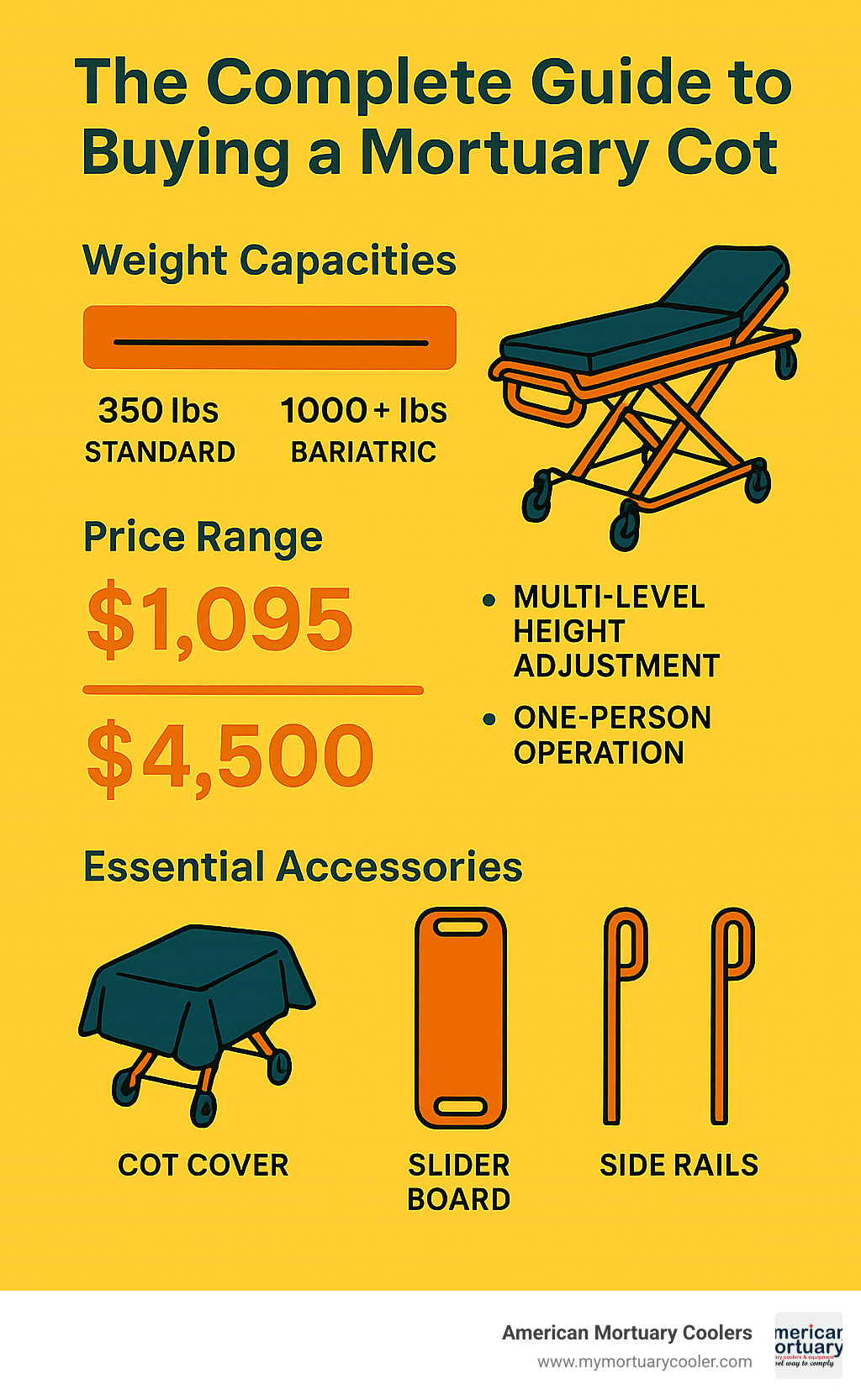
Quick mortuary-cot terms:
What Is a Mortuary Cot and Its Purpose
When someone passes away, their journey from the place of death to the funeral home requires specialized equipment that honors their dignity while keeping operators safe. A mortuary-cot is exactly that - a purpose-built stretcher designed specifically for transporting deceased individuals during first-call removals.
Think of it as the difference between a moving truck and a luxury sedan. Both get you from point A to point B, but they're built for completely different purposes. While ambulance stretchers focus on patient comfort and medical access, a mortuary-cot prioritizes weight capacity, stability, and respectful handling during transport.
The primary purpose goes far beyond just moving someone. These specialized stretchers maintain dignity during the most sensitive moments while protecting funeral service operators from injury. As Ferno, a manufacturer with over 65 years of experience, puts it: their mortuary products are designed "to provide services with dignity and ease."
What makes mortuary cots different? They're built with features you won't find on standard stretchers. Multi-level height adjustment lets operators work at comfortable levels - some models like the Ferno Model 24 offer up to 6 different height settings. Improved weight capacities range from 350 pounds on basic models up to over 1,000 pounds for bariatric situations.
Built-in stair guides help steer tight spaces and staircases safely. Specialized restraint systems secure individuals respectfully during transport. The materials are chosen specifically for easy cleaning and disinfection - crucial in funeral service operations.
The Latest guidance on respectful transport makes clear that your equipment choice directly impacts the dignity of care you provide to families. This makes selecting the right mortuary-cot not just an operational decision, but an ethical one that reflects your professional standards.
When you're making that first call, having the right equipment means everything runs smoothly. The family sees professionalism. Your staff stays safe. And the deceased is treated with the respect they deserve.
Mortuary-Cot Types and When to Use Each
The world of mortuary-cots offers more variety than you might expect. Each type serves specific needs, and understanding these differences can save you from headaches down the road. Let's walk through the main categories and when each one makes the most sense for your operations.
Standard & Multi-Level
Think of standard mortuary-cots as your reliable workhorses. These models typically handle 350-500 lbs and feature the multi-level height adjustment that's become essential in modern funeral service. The MOBI F500 is a perfect example - it supports 500 lbs and can be operated by one person thanks to its smart multi-level design.
These cots shine in residential removals where you're working in tight spaces, hospital transfers with standard bed heights, and general funeral home operations where you need dependable, single-operator capability. The multi-level feature is a game-changer here - you can adjust the cot height to match beds, tables, or vehicle loading heights, which saves your back and makes transfers much smoother.
One funeral director with 25+ years of experience using a Ferno Model 24 put it perfectly: "Excellent equipment... only required maintenance" over decades of daily use. That's the kind of reliability you want when families are counting on you.
Bariatric Mortuary-Cot Solutions
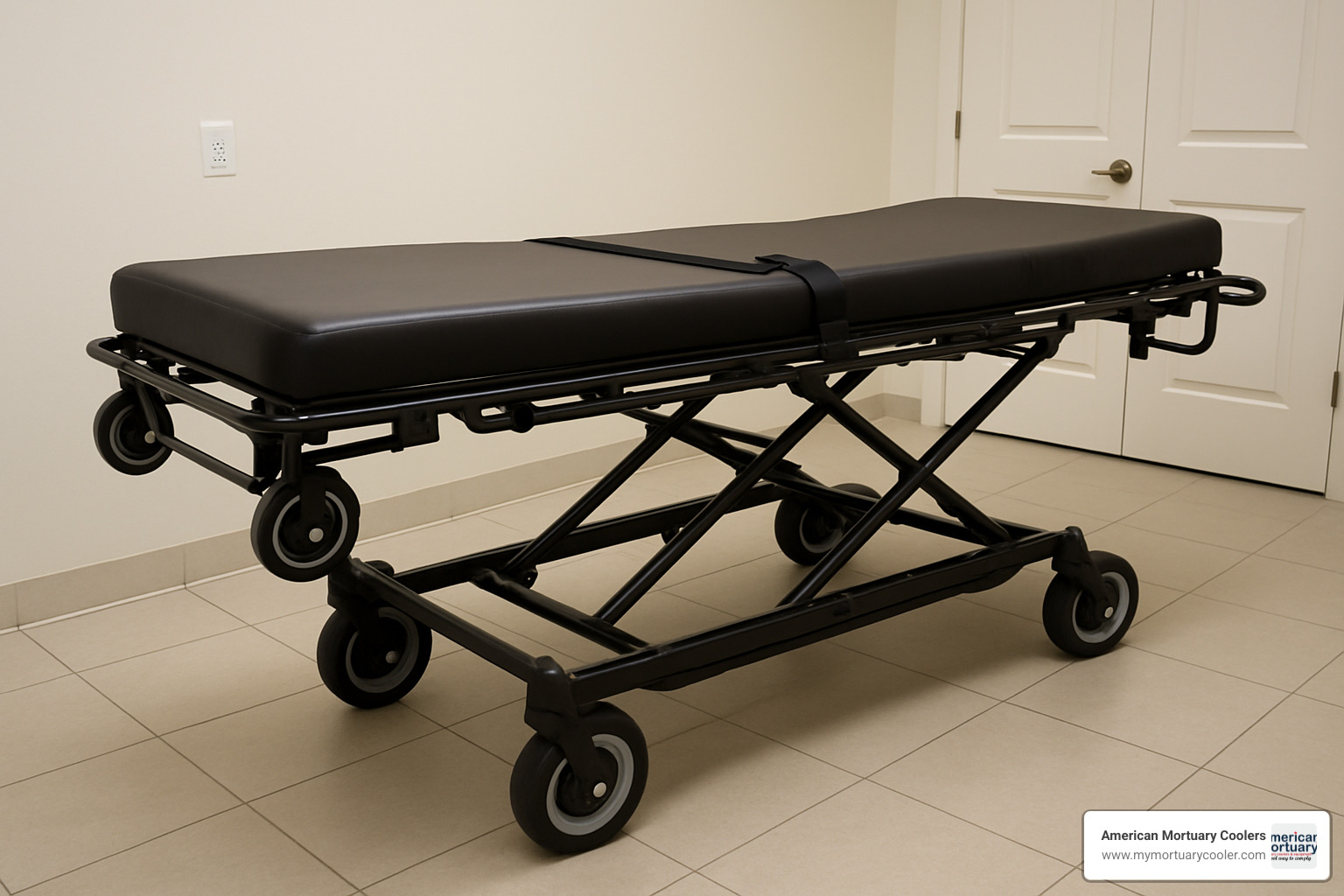
When standard cots aren't enough, bariatric models step up to handle the heavy lifting. The MOBI F1200 Multi-Level Bariatric Mortuary Cot is rated for 1000+ lbs, which covers even the most challenging cases you'll encounter.
These specialized units feature reinforced welded steel frames that won't buckle under pressure, expandable storage compatibility for oversized cases, and improved wheel systems designed to roll smoothly even with maximum loads. The wider platforms ensure dignity and proper support for larger individuals.
The bariatric market has grown significantly as funeral homes see more cases requiring this specialized handling. One funeral director told us about using an expandable bariatric frame for cases that standard mortuary refrigerators couldn't accommodate - it's all about having the right tools for every situation.
High-Loading & Tall Cots
Modern vehicles sit higher than the hearses of yesteryear, and high-loading cots like the F500 Tall are designed specifically for this reality. These models typically offer loading heights of 28-32 inches, making them perfect for SUVs and modern hearses with higher floor clearances.
The specialized leg configurations work seamlessly with today's vehicles, while roll-in style options make loading almost effortless. The Ferno 24H-miniMAXX for High Floor Vehicles is a great example of how manufacturers are adapting to changing vehicle designs.
When you're dealing with hospital removals, reach for your standard multi-level cot. For bariatric cases over 500 lbs, you'll need those specialized bariatric models. High-floor vehicle operations call for tall or high-loading designs, while space-constrained removals work best with folding models. Pediatric cases deserve their own specialized cots, and when you're working alone, one-person operation models are invaluable. For the heaviest transfers, the MegaMover with 1000 lb capacity handles what others can't.
Key Features, Capacities, and Specifications to Compare
Shopping for a mortuary-cot can feel overwhelming with all the technical specs and features to consider. But understanding the key differences will help you make the right choice for your funeral home's needs.
Weight capacity sits at the heart of every mortuary cot decision. The most basic folding stretchers handle 350 lbs, which works fine for lighter cases but leaves you scrambling when you need more capacity. Standard cots in the 400-500 lb range cover most situations funeral homes encounter daily.
For those times when you need serious lifting power, heavy-duty models supporting 600 lbs give you that extra peace of mind. And when standard equipment just won't cut it, bariatric units rated for 1000+ lbs ensure you're prepared for any situation that walks through your door.
The frame material makes a real difference in how your cot performs over time. Steel construction offers rock-solid durability and higher weight limits - perfect for busy operations that need equipment to last. Aluminum frames weigh less, making them easier for staff to maneuver, but they typically can't handle as much weight. The Morivita Economy Mortuary-cot, built with stainless steel, weighs just 57 lbs while still supporting 350 lbs safely.
When you're investing in professional equipment, certifications matter. Look for FDA, CE, and ISO 9001 compliance - these aren't just fancy letters, they mean the equipment has been tested and meets safety standards for medical and mortuary use. Most quality cots carry multiple certifications, showing the manufacturer takes safety seriously.
An Essential Guide to Comparing and Buying Mortuary Cots walks through detailed comparison frameworks if you want to dive deeper into the evaluation process.
Dimensions & Loading Heights
Getting the measurements right prevents headaches down the road. Most mortuary-cots measure between 76-84 inches long and 19-22 inches wide - dimensions that fit through standard doorways while providing adequate support.
The height adjustment range typically runs from 9-11 inches at the lowest setting up to 32-34 inches fully extended. This flexibility lets you match bed heights, vehicle loading platforms, and prep room tables without straining your back.
Take the Ferno Model 24 as an example - it measures 76" × 19" with height adjustment from 9.25" to 32.25" and a 24" loading height. These aren't random numbers; they're carefully designed to work with the spaces and equipment you encounter every day.
Transport clearance becomes crucial when you're navigating tight hallways or small elevators. Many models feature foldable undercarriages that convert the cot into a narrower two-wheeled stretcher, giving you the flexibility to handle challenging removal locations.
Safety & Ergonomics
The reality of modern funeral service is that one-person operation isn't just nice to have - it's essential. Labor costs and scheduling demands mean your staff often handle removals solo. Multi-level height adjustment makes this possible by letting operators match surface heights instead of lifting dead weight.
Side rails provide that extra security during transport, preventing accidental displacement while maintaining a dignified appearance. Universal side rail attachments, like the MOBI-F500SR, can be added to multiple cot series and even retrofitted to existing equipment you already own.
Smart design features like release levers and automatic load-end legs reduce the physical strain on your staff. The Ferno Model 24's special release levers allow height adjustment without bearing the full weight, while automatic load-end legs provide stability during unloading - small details that make a big difference during long days.
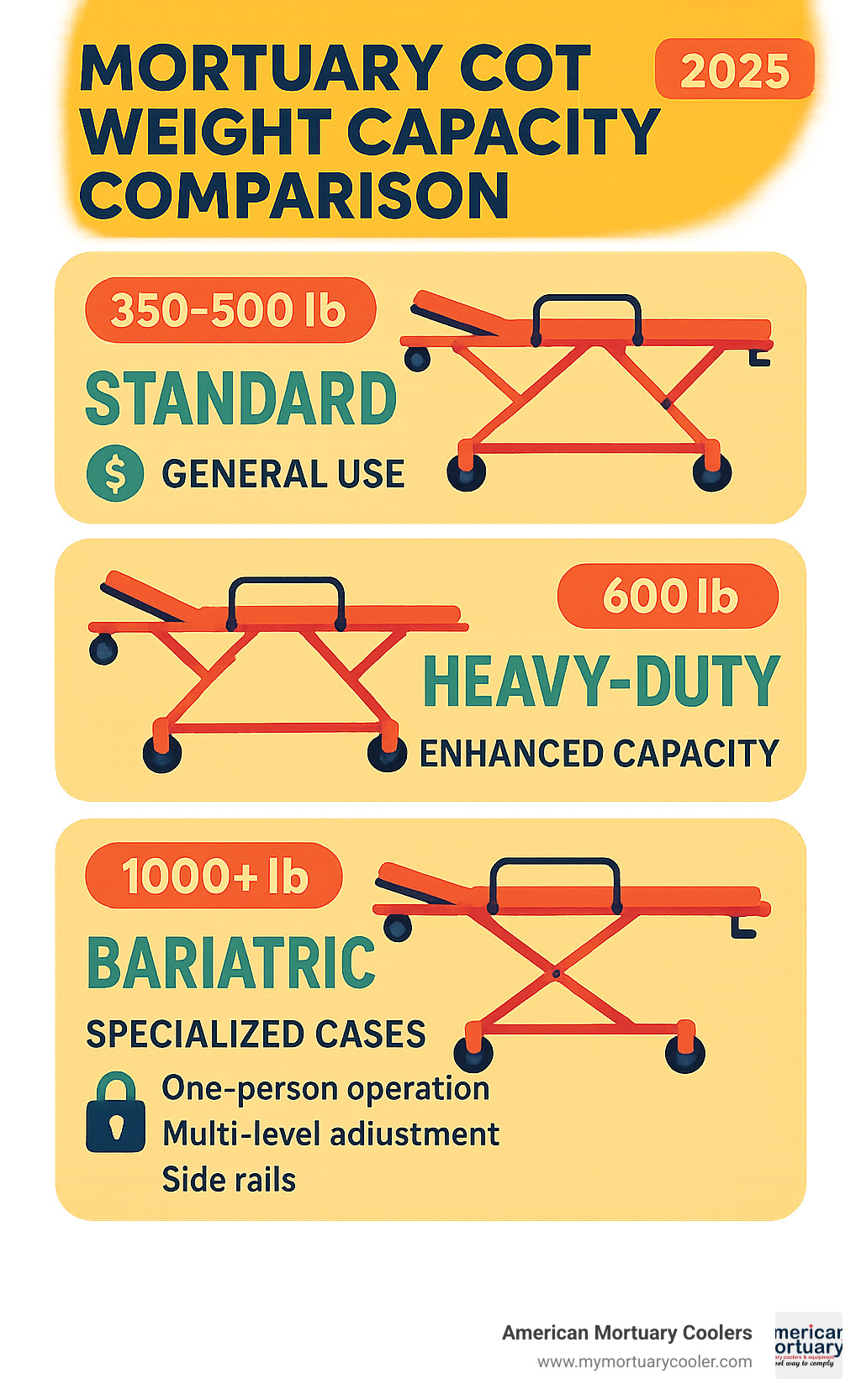
Accessories, Safety Innovations, and Compliance Standards
The right mortuary-cot becomes even more effective when paired with thoughtful accessories that improve both safety and dignity. Think of these add-ons as the supporting cast that helps your main equipment shine when it matters most.
Cot covers represent one of the most important accessories you'll invest in. These aren't just fabric wraps - professional covers feature waterproof interiors that protect against fluids while maintaining stain-resistant exteriors that preserve dignity during transport. The secure zipper systems ensure everything stays properly contained, giving families peace of mind during an already difficult time.
Document pouches might seem like a small detail, but they're lifesavers during busy removal calls. Having paperwork organized and accessible prevents those awkward moments of fumbling through folders while families wait. It's one of those simple touches that shows professionalism.
Slider boards have genuinely revolutionized transfer safety. The Pro Slider Board comes with multiple grip handles positioned exactly where you need them, and the non-weight-bearing design means you're guiding rather than lifting during lateral transfers. For heavier cases, the MegaMover steps up with its impressive 1000 lb capacity and 14 strategically placed handles - perfect for team lifting scenarios where coordination is everything.
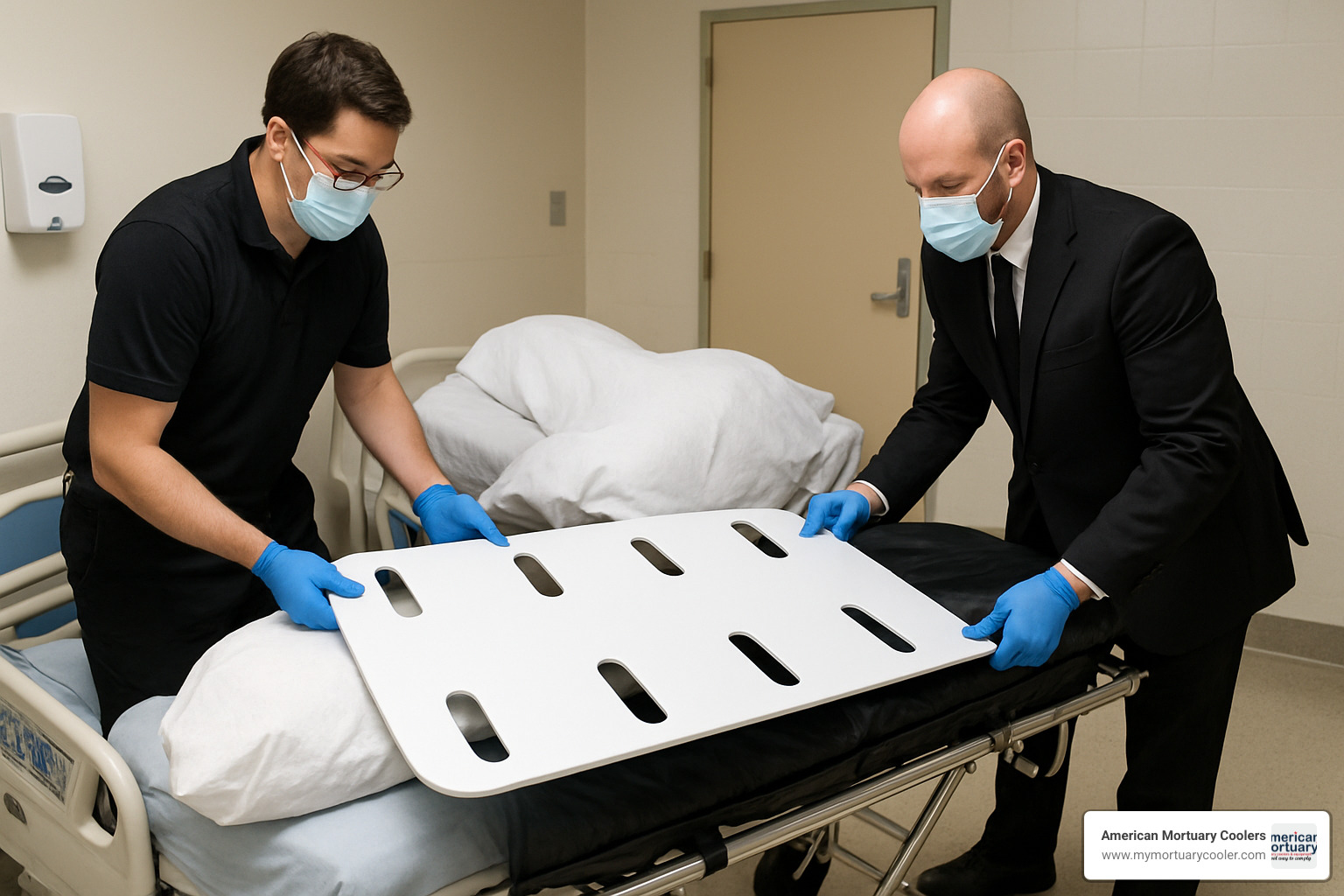
Universal side rails deserve special mention for their versatility. The MOBI-F500SR series fits multiple cot types and can even be retrofitted to existing equipment. This flexibility means you're not locked into one manufacturer's ecosystem - a practical consideration for growing operations.
Vehicle loading ramps address one of the most physically demanding aspects of the job. Rather than straining to lift loaded cots into high-floor vehicles, proper ramps create smooth transitions that protect both operators and equipment.
Many suppliers now offer combo packages that bundle essential accessories together. These typically include slider boards and covers, representing savings of over $100 compared to individual purchases. It's worth asking about these packages when you're making your initial cot investment.
One exciting development is the CuddleCot system, which uses thermoelectric cooling instead of traditional refrigeration. This portable cooling solution works anywhere and requires minimal maintenance - a game-changer for extended transport situations or when temporary storage becomes necessary.
Scientific research on transfer ergonomics continues driving innovation in this space, with researchers focusing on reducing operator injuries while improving transfer efficiency.
New Technologies on the Horizon
The funeral industry might not be the first place you'd expect cutting-edge technology, but some fascinating innovations are emerging that promise to make operations safer and more efficient.
Power-assist systems are starting to appear on premium models. These battery-powered units handle height adjustments and provide transport assistance, dramatically reducing physical strain on operators. For bariatric applications where manual operation becomes genuinely challenging, these systems aren't just convenient - they're necessary.
Antimicrobial coatings represent another significant advancement. These specialized surface treatments provide continuous protection against harmful microorganisms, working around the clock between cleanings. It's like having an extra layer of safety that never takes a break, which adds real peace of mind in infection-conscious times.
IoT location tracking might sound like overkill, but for larger operations managing multiple vehicles and locations, smart cots with integrated tracking help ensure proper maintenance scheduling and equipment inventory management. No more wondering which cot is due for service or where that missing stretcher ended up.
These technologies are still emerging, but they point toward a future where mortuary-cot operations become safer, more efficient, and less physically demanding for operators. As these innovations mature and costs come down, they'll likely become standard features rather than premium options.
Maintenance, Cleaning, Pricing, and ROI
Taking care of your mortuary-cot isn't complicated, but it makes all the difference in keeping your equipment running smoothly when you need it most. Think of it like maintaining a reliable work truck - a little attention goes a long way.
Daily maintenance is straightforward: wipe down all surfaces with EPA-approved disinfectants after each use. This simple step prevents buildup and keeps your cot looking professional. The stainless steel construction on most professional models makes this easy - no special cleaners or complicated procedures required.
Weekly inspections take just a few minutes but catch problems before they become expensive repairs. Check that wheels roll smoothly, locks engage properly, and height adjustment mechanisms work without binding. Test the restraint system and look for any signs of wear on belts or buckles.
Monthly tasks include lubricating moving parts and giving restraints a thorough inspection. Most manufacturers provide specific lubrication points in their manuals - following these guidelines prevents premature wear and ensures smooth operation for years.
The three-step cleaning process works for any situation: first, remove debris and organic matter; second, apply EPA-approved disinfectant according to label directions; third, do a final inspection to ensure everything looks and functions properly. This systematic approach ensures nothing gets missed during busy periods.
Understanding mortuary cot pricing helps you make smart purchasing decisions. The market spans a wide range based on what you actually need:
Entry-level folding stretchers start around $1,095 to $1,500 and work well for occasional use or backup situations. The MOBI F500 Multi-Level at $1,095 offers excellent value in this category - proving you don't need to spend a fortune for reliable equipment.
Standard multi-level cots run $1,500 to $2,500 and handle most daily operations comfortably. These models typically support 400-500 lbs and include the height adjustment features that make single-person operation possible.
Heavy-duty models in the $2,500 to $3,500 range offer increased capacity and durability for busy operations. If you're doing multiple calls daily, this extra investment pays off in reduced downtime and maintenance costs.
Bariatric systems represent the premium end at $3,500 to $4,500+, with models like the Ferno 24-Maxx Mortuary Cot at $4,344.95. These specialized units handle 1000+ lb capacities that standard cots simply can't manage safely.
Return on investment goes beyond the initial purchase price. Ergonomic design reduces operator injury costs - and anyone who's dealt with workers' compensation claims knows how expensive back injuries can be. Higher-quality cots also last longer, reducing replacement frequency and the downtime that comes with equipment failures.
Professional appearance matters more than many funeral directors realize. Families notice when equipment looks well-maintained and operates smoothly. This attention to detail builds trust and reflects your commitment to dignified service.
Financing options have improved significantly in recent years. Many suppliers now offer 0% down payment plans and 90-day no-payment terms on qualifying orders. This flexibility lets you access better equipment without straining cash flow - particularly helpful when upgrading multiple pieces simultaneously.
The Beginners Guide to Finding a Mortuary Cot Supplier walks through the supplier evaluation process and includes tips for negotiating better terms. Finding the right supplier relationship often matters as much as choosing the right equipment.
Best Practices for Safe & Dignified Transport
Implementing proper procedures ensures both operator safety and dignified care throughout the transport process. Training represents the foundation of safe operation, with emphasis on proper body mechanics, equipment operation, and emergency procedures.
Operator Training Essentials:
- Proper lifting techniques and body mechanics
- Equipment-specific operation procedures
- Stair navigation using built-in guides
- Emergency procedures for equipment failure
- Dignity protocols for family interactions
Stair navigation requires specific techniques utilizing built-in stair guides. The Ferno Model 24's integrated stair guides allow the cot to slide down stairs safely when used in two-wheeled stretcher mode. Operators should always use these guides rather than attempting to carry full weight down stairs.
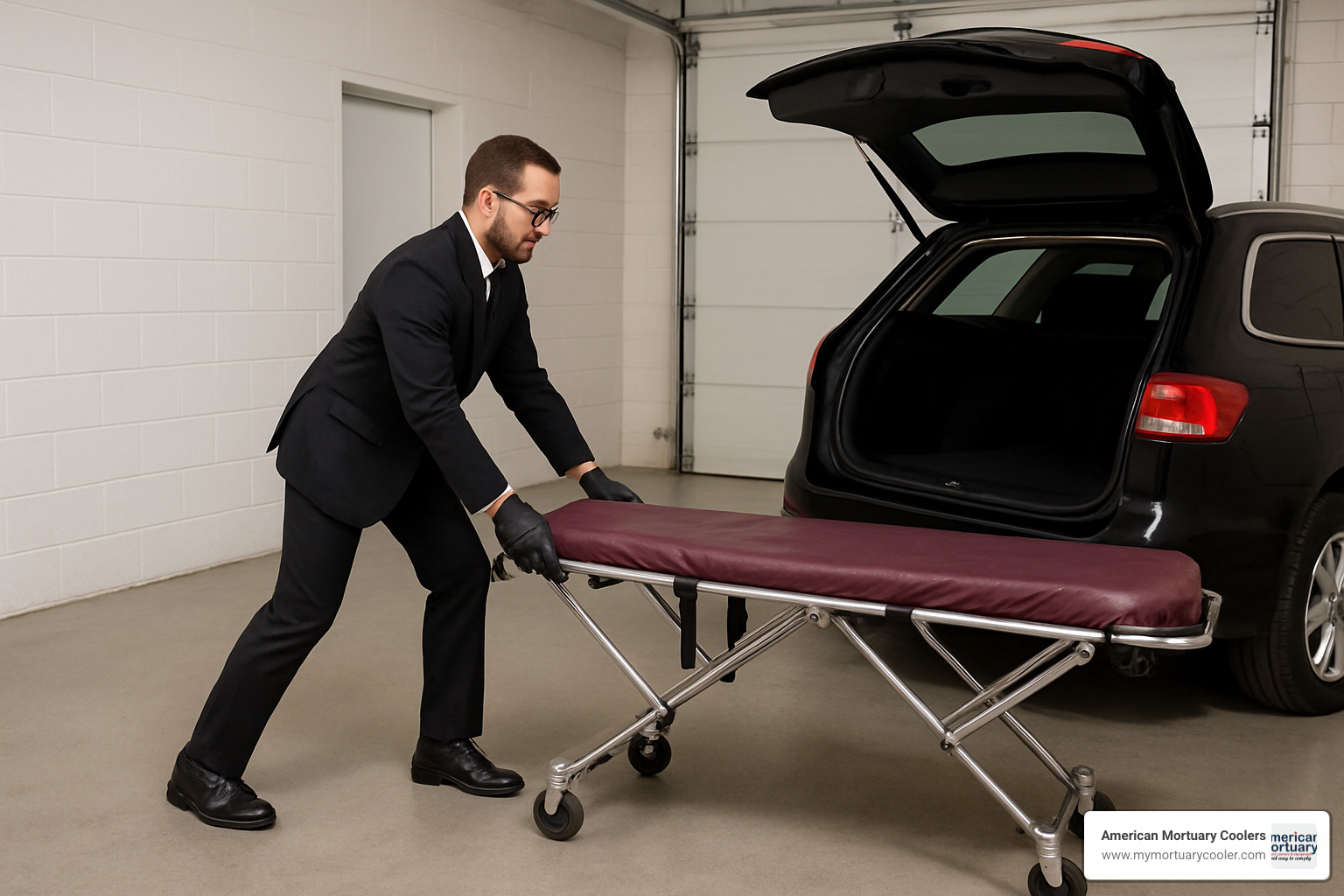
Restraint systems must be properly secured but applied with dignity. The standard two-piece restraint systems should be snug but not overly tight, with attention to maintaining dignified appearance. Document pouches should be used for paperwork rather than placing items directly on the cot.
Storage Best Practices:
- Store cots in folded position to save space
- Keep in clean, dry environment
- Ensure wheels are locked during storage
- Maintain accessory inventory (covers, restraints)
- Regular inspection schedule adherence
Workflow efficiency improves through proper equipment selection and operator training. High-floor vehicle ramps should be used when available, and cot height should be pre-adjusted for anticipated transfer heights.
Frequently Asked Questions about Mortuary-Cot Selection
When you're shopping for a mortuary-cot, certain questions come up again and again. I've helped hundreds of funeral homes steer these decisions, and these are the three questions that matter most for getting the right equipment.
How does a mortuary-cot differ from an ambulance stretcher?
The biggest difference comes down to what each piece of equipment needs to accomplish. Ambulance stretchers focus on keeping living patients comfortable and giving EMTs access for medical care. Mortuary cots have a completely different job - they're built for dignity, stability, and the unique challenges of removal work.
Weight capacity tells the story clearly. Most ambulance stretchers max out around 350-500 lbs, while mortuary cots routinely handle 400-1000+ lbs. That extra capacity isn't just about size - it reflects the heavier-duty construction needed for facility-to-facility transfers.
Design features also differ significantly. Mortuary cots include specialized height adjustment systems that work perfectly for matching bed heights, vehicle loading, and prep room tables. You'll find built-in stair navigation guides that make residential removals safer and more manageable.
The materials matter too. Ambulance stretchers use padding and comfort features that would be inappropriate for mortuary work. Mortuary-cot surfaces are selected for easy cleaning and disinfection, maintaining professional appearance while meeting strict hygiene requirements.
What weight capacity should my mortuary-cot have?
This question gets to the heart of smart equipment planning. Standard 400-500 lb capacity handles the majority of cases effectively, but your specific situation determines what you actually need.
Regional demographics play a huge role in this decision. If you serve an area with higher obesity rates, investing in bariatric capabilities makes sense from day one. Areas with more elderly populations might get by with standard capacity longer.
Service mix matters just as much. Hospital contracts often involve heavier cases than residential removals. If you're doing nursing home work or serving medical facilities, you'll encounter situations where that extra capacity becomes essential.
Future-proofing represents smart business thinking. Bariatric cases continue increasing nationwide, and the MOBI F1200 Multi-Level Bariatric at 1000+ lbs provides operational flexibility that pays off over time. Meanwhile, the MOBI F500 at 500 lbs offers excellent value for standard operations.
Operator safety improves with higher capacity models because they typically include better ergonomic features. Even if you don't need the weight capacity immediately, the improved design often justifies the investment.
How do I clean and disinfect a mortuary cot correctly?
Proper cleaning protects both your staff and your reputation. The three-step process using EPA-approved disinfectants ensures thorough decontamination every time.
Pre-cleaning removes visible debris and organic matter using disposable cloths. This step matters because disinfectants work best on clean surfaces. Don't skip this even when the cot looks clean - microscopic contamination requires attention.
Disinfection involves applying EPA-approved disinfectant according to manufacturer contact time requirements. Different disinfectants have different contact times, so read the labels. The stainless steel construction common in professional cots handles these chemicals well while maintaining appearance.
Final inspection checks all surfaces, moving parts, and restraint systems. Look for wear, damage, or areas that might need additional attention. This inspection catches problems before they become safety issues.
Weekly inspections should include mechanical components, wheel function, and restraint system integrity. These weekly checks prevent equipment failures during critical moments and extend overall equipment life.
Always follow your facility's infection control protocols and maintain documentation of cleaning procedures for regulatory compliance. Some states require specific documentation, so check local requirements.
Conclusion
Choosing the right mortuary-cot comes down to understanding your specific needs and matching them with the right equipment. Whether you're handling standard removals or need specialized bariatric capabilities, the market offers solutions from basic 350-lb folding stretchers at $1,095 to heavy-duty systems supporting over 1,000 lbs at $4,500+.
The most important factors to consider are weight capacity that matches your service area demographics, multi-level height adjustment for safe single-operator use, and accessory compatibility for complete transport solutions. Features like built-in stair guides, universal side rail compatibility, and professional restraint systems separate quality mortuary cots from basic stretchers.
Think of your mortuary-cot as an investment in your team's safety and your facility's reputation. The right equipment reduces operator injuries, improves efficiency, and shows families you care about dignified service. As one funeral home operator shared after 25+ years with their Ferno equipment: the quality justifies the investment through reliable, long-term performance that you can count on.
At American Mortuary Coolers, we know that your mortuary-cot is just one piece of your complete first-call system. Our custom mortuary cooler solutions work seamlessly with professional transport equipment to create smooth workflows from removal through storage. With direct delivery across the contiguous 48 states from our Tennessee facility, we're here to support your equipment needs whether you're in Johnson City, Atlanta, Chicago, or anywhere in between.
The right mortuary-cot choice reflects your commitment to dignified care while protecting your operators and making your job easier. Take time to evaluate what you really need, think about future requirements, and invest in equipment that matches your professional standards. Your families and your staff will notice the difference.
More info about cooler and cot packages - find how integrated cooling and transport solutions can streamline your first-call operations and make your work more efficient.
















